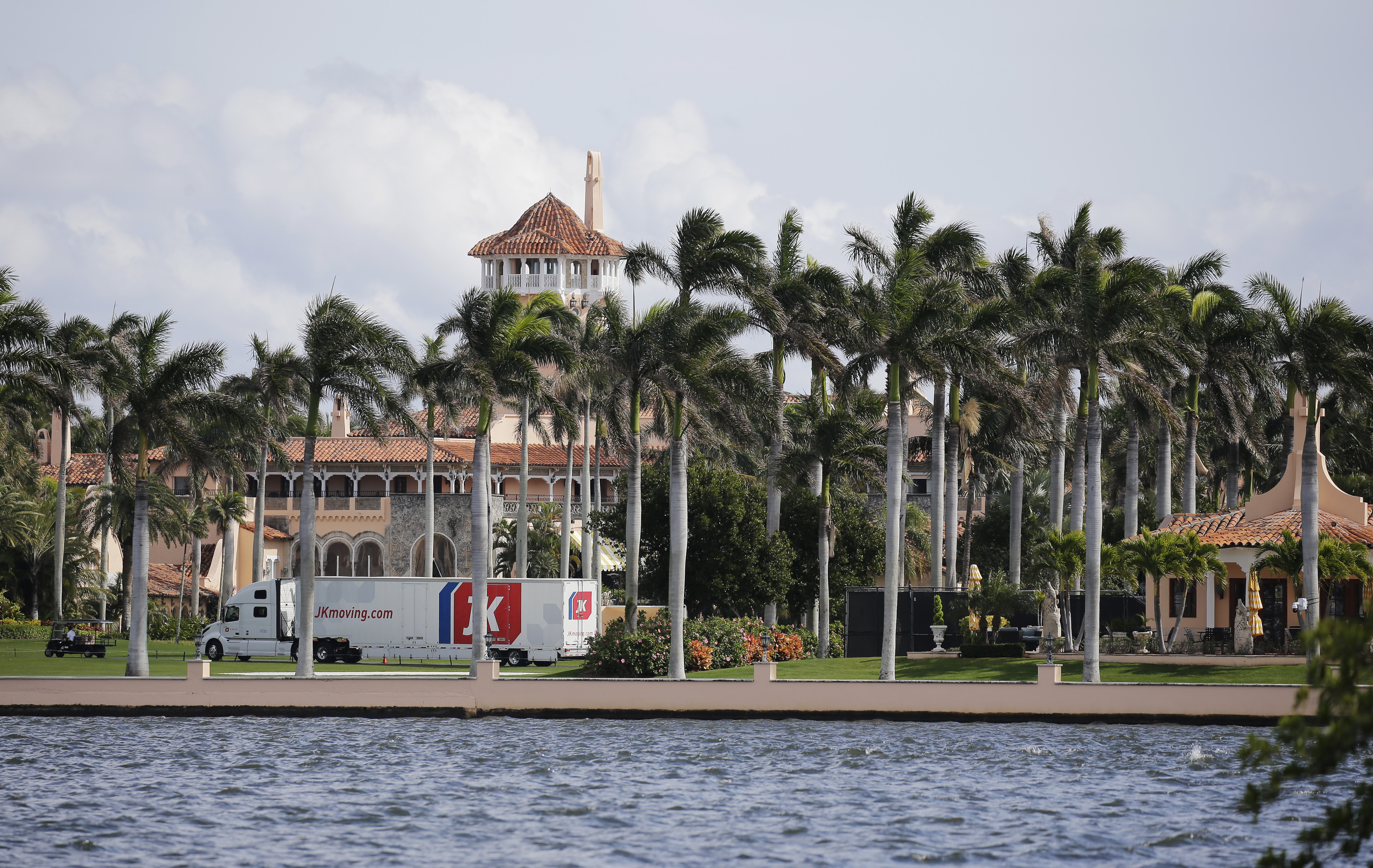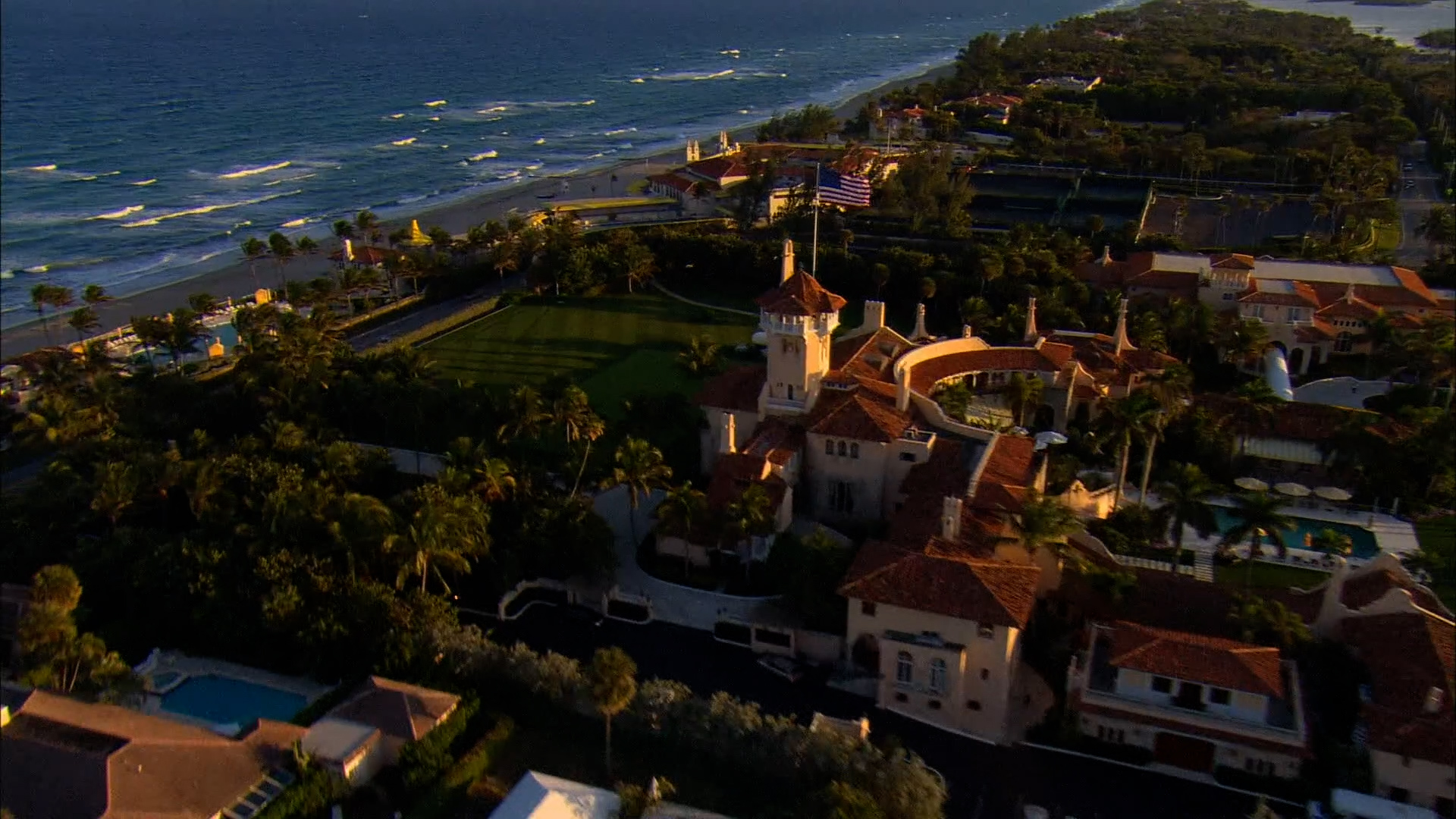As president, Donald Trump never liked to leave a paper trail. He avoided email, admonished aides to stop taking notes during meetings and ripped up documents when he was finished with them. But Trump was unwilling to part with some of his administration’s records when he left the White House last year, whisking them away to his Mar-a-Lago resort in Florida.
And while more than a dozen boxes of documents have since been returned to the National Archives and Records Administration, on Monday the FBI searched Trump’s Palm Beach estate for presidential material as part of an ongoing federal investigation into whether he took classified records from the White House to his Florida residence.
The Justice Department has been investigating the potential mishandling of classified information at the request of the National Archives.
The revelation that Trump took government records with him to Mar-a-Lago has created a political headache for the former president — and a potential legal one, too.
We've got the news you need to know to start your day. Sign up for the First & 4Most morning newsletter — delivered to your inbox daily. >Sign up here.
Here's a look at the laws regarding presidential records and how Trump may have violated them:
WHAT IS THE PRESIDENTIAL RECORDS ACT?
The 1978 law requires the preservation of White House documents and mandates that presidential records are the property of the U.S. government, rather than belonging to the president himself.
The law was passed in the aftermath of the Watergate scandal, when a collection of secret tapes that President Richard Nixon had considered destroying played a defining role. The tapes revealed that Nixon tried to cover up the bungled burglary of Democratic National Committee headquarters. He chose to resign rather than face impeachment and removal from office.
HOW MAY TRUMP HAVE VIOLATED THE PRESIDENTIAL RECORDS ACT?
The National Archives and Records Administration confirmed in February 2022 that Trump had to return 15 boxes of records, including documents containing classified information, that were improperly taken from the White House, NBC News reported.
Among the items Trump had taken were correspondence with North Korean leader Kim Jong Un and a handwritten letter that former President Barack Obama had left behind in the Oval Office for his successor, two sources told The Washington Post.
Trump maintained that presidential records were turned over “in an ordinary and routine process.”
At the time, the records agency said it believed Trump still had more documents that needed to be turned over and that the former president's representatives said "they are continuing to search" for records that belong to the National Archives. The agency also referred the matter the Justice Department to investigate the potential mishandling of classified information.
A week earlier, NARA revealed that Trump had torn up numerous documents when he was president that were supposed to have been preserved. It also said that the agency learned that White House staff frequently conducted official business using unofficial messaging accounts and personal phones. Those staff did not copy or forward their official messaging counts, as required by the Presidential Records Act.
WHAT CONSEQUENCES COULD TRUMP FACE FOR MISHANDLING WHITE HOUSE DOCUMENTS?
There are multiple federal laws governing the handling of classified records and sensitive government documents, including statutes that make it a crime to remove such material and retain it at an unauthorized location.
Concealing or destroying records is a crime with a potential prison term of three years; removing and storing classified information in an unauthorized location can carry a sentence of up to five years. Another statute governing classified information makes it a crime to mishandle classified records either intentionally or in a grossly negligent manner.
And while a search warrant doesn't necessarily mean criminal charges are near or even expected, federal officials looking to obtain one must first demonstrate to a judge that they have probable cause that a crime occurred.
Though prosecutors could theoretically charge an individual for extreme negligence, Justice Department prosecutions over the last century have focused on what former FBI Director James Comey described in 2016 as a “clearly intentional and willful mishandling of classified information,” indications of disloyalty to the United States, efforts to obstruct justice or the exposure of vast quantities of classified information that could suggest an intent to commit misconduct.
Comey made the statement in announcing the FBI would not recommend charging Clinton for her handling of classified material through a private email server she used as secretary of state in the Obama administration.
In other words, the mere misuse of classified information does not necessarily form the basis of a prosecution.
Sandy Berger, President Bill Clinton’s former national security adviser, removed classified documents from the National Archives in 2003. He claimed he took the files to help prepare testimony to the 9/11 Commission, which was probing intelligence failures in the years leading up to the terrorist attacks in 2001. Berger pleaded guilty and, instead of serving time behind bars, he paid a $50,000 fine.
However, there’s never been a case where a former commander in chief has been punished for violating the Presidential Records Act. Lee White, director of the National Coalition for History, said Congress failed to improve enforcement when it updated the law in 2014. The statute by definition depends on the goodwill of presidents and their staff to police their own record keeping.
White said archivists explain in detail to staff members when a new administration takes over the need to preserve all notes, emails, calendars, phone records, text messages and transcripts.
“You don’t just get hired at the White House and they stick you at your desk. They walk you through all these rules,” he said. “Nobody can claim ignorance.”
HOW DOES THE NATIONAL ARCHIVES KNOW WHAT'S MISSING?
Generally, the archivists know what's missing based on documents they've received from other administration sources, such as the vice president's office or other government agencies, for example, and then cross-referencing those records. If a president calls the vice president but a record of the call only exists on the vice president's call log, archivists can assume there is missing records from the president's side.
Additionally, the congressional committee investigating the Jan. 6 attack on the U.S. Capitol in 2021 is examining the former president’s actions that day, but finding gaps in official records such as call logs — gaps that the National Archives was been unable to fill. Trump tried and failed to withhold White House documents from the House Select committee in a dispute that was decided by the U.S. Supreme Court.
DOES TRUMP’S STATUS AS A FORMER PRESIDENT FACTOR INTO THE FBI'S INVESTIGATION?
This will be a key question since Trump could presumably attempt to argue that, while president, he had original classification authority and was the ultimate arbiter in determining what is classified — and what is no longer so — and that the documents in his possession had been declassified.
“I doubt that Trump or people close to him went through such a formality given what we know about the informality with which he treated official documents,”said David Laufman, who as the former head of the Justice Department’s counterintelligence section was involved in the 2016 investigation into former Secretary of State Hillary Clinton. “But the fact that he possessed that authority could muddy the water, potentially, for the government meeting its burden of proof in a criminal case.”
He added that the department should attempt to unpack the relevant facts, adding that it would be “derelict” for the FBI to not undertake an investigation and see where the facts lie.



